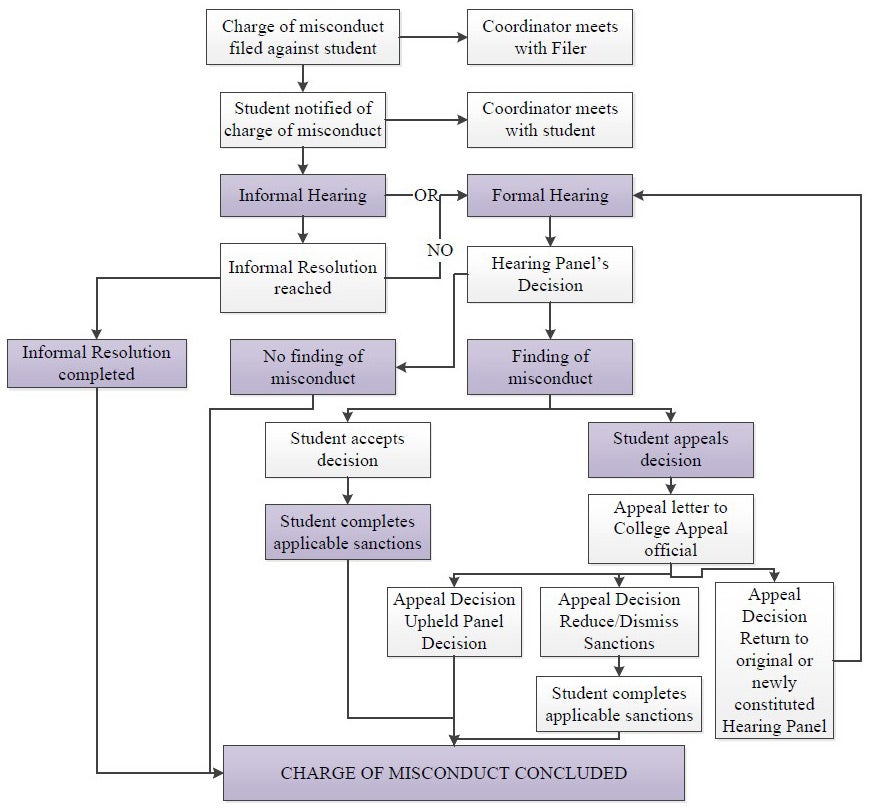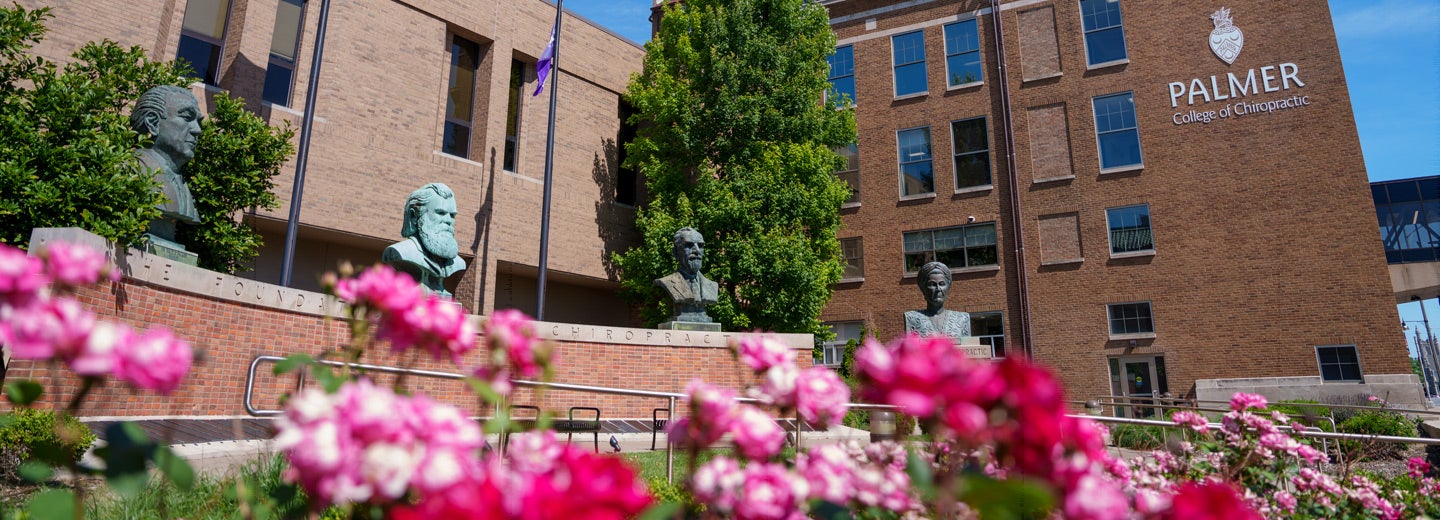Students enrolled by the College must be guided by the highest standards of ethical conduct. They are expected to demonstrate professional qualities when dealing with persons in the academic community, with chiropractic patients and with the public.
The intent of the Code is to ensure that students neither lose their rights nor escape the responsibilities of citizenship.
All students are expected to read and understand the Student Code of Ethics Handbook.
Report Misconduct
All members of the College community share the responsibility for promoting and supporting the Student Code of Ethics. Therefore, members of the College community are to immediately report any behavior or conduct that may be interpreted as a violation of the Code.
Members of the College community may also report student misconduct directly to the appropriate campus Student Code of Ethics Coordinator.
 Palmer Main Campus
Palmer Main Campus
Student Code of Ethics Coordinator
Lori Larsen, B.A.
Office of Compliance
1000 Brady St.
Davenport, Iowa 52803
563-884-5246
lori.larsen@palmer.edu
 Palmer Florida
Palmer Florida
Student Code of Ethics Coordinator
Jason Brewer, M.S.
Office of Student Services
4777 City Center Parkway
Port Orange, Florida 32129
386-763-2781
jason.brewer@palmer.edu
 Palmer West
Palmer West
Student Code of Ethics Coordinator
Michael Crump, M.Ed.
Office of Student Academic Affairs
90 E. Tasman Drive
San Jose, California 95134
408-944-6122
michael.crump@palmer.edu
Reporting Violations of Local, State or Federal Law
Students are expected to abide by local, state and federal laws. Any student who has been convicted of; pled guilty to; did not contest; forfeited bail; or was granted a deferred judgment to any criminal conduct under law or ordinance shall notify the College. Such notification should be reported within five calendar days.
This notification requirement excludes only minor traffic violations. Failure to promptly report may result in disciplinary action up to and including dismissal.
OR
Report in-person, by email or phone to:
Palmer Main Campus
Michael Tunning, D.C., M.S. ATC
Dean of Academic Affairs
563-884-5865
michael.tunning@palmer.edu
Palmer Florida
Jason Brewer
Dean of Students
386-763-2781
jason.brewer@palmer.edu
Palmer West
Michael Crump, M.Ed.
Director of Student Services
408-944-6122
michael.crump@palmer.edu
Student Ethics Process
Notification Letter
When the Office of Compliance receives a charge(s) of misconduct alleging that a student may have violated the Student Code of Ethics, a notification letter is sent to the student notifying them of the charge(s).
Respondent
The term respondent refers to any student, organization or club which as been charged with ethical misconduct.
Filer
The term filer refers to any member of the College community who submits a charge alleging ethical misconduct.
Orientation
An orientation is an informal meeting with a representative from the Office of Compliance who will provide the student with a copy of the charge(s) of misconduct, explain the student ethics process and answer any questions. It is NOT a hearing, but an opportunity for a student to become more informed about the charge and the resolution process.
Timing
A number of factors influence the length of time it takes to conclude the Student Code of Ethics process. The most significant factors include the student’s timely response to official notices; the student’s and filer’s willingness to resolve the charge(s) of misconduct; the determination as to whether an informal or formal hearing will be conducted; and scheduling of all parties needed at the hearing.
Hearings
The Student Code of Ethics provides for two distinct types of hearings; informal and formal.
Informal Hearings
Informal hearings are conducted when a charge(s) of misconduct may be disposed of informally on a basis acceptable to the College. They can typically be scheduled quickly, at the convenience of the responding student, the person filing the charge(s) of misconduct and the Coordinator.
Formal Hearings
Formal hearings are typically conducted when:
- a resolution was not reached in an informal hearing;
- an informal resolution was violated;
- a student charged with misconduct has a prior record of either an informal resolution or a formal finding of misconduct; or
- the filer, responding student or Coordinator chooses not to invoke the informal process.
Formal hearings are heard by the Student Ethics Hearing Panel.
Formal hearings provide an opportunity for the filer to present any facts and/or evidence underlying the charge(s) of misconduct alleged against the student. Likewise an opportunity is provided to the student to present any facts and/or evidence in defense of the charge(s) of misconduct alleged against him/her.
Student Ethics Hearing Panel
Hearing panel refers to persons authorized to decide if ethical misconduct has been proven and, if appropriate, what sanctions shall be imposed.
Decision Letter
Upon conclusion of a formal hearing, the decision whether misconduct has been proven will be detailed in a decision letter as well as sanctions imposed, if appropriate. Further, deadlines for completion will be specified. If the sanction is not fulfilled, a subsequent charge of misconduct may be filed against the student respondent under Article VI, Part I, Section M, Paragraph 9.
Sanctions
The following sanctions may be imposed for misconduct:
- Warning: A written reprimand for misconduct.
- Loss of privileges: Denial of specified privileges for a designated period of time.
- Fines: Previously established and published fines may be imposed.
- Restitution: Compensation for loss, damage or injury. This may take the form of appropriate services and/or monetary or material replacement.
- Discretionary sanctions: Educational remediation, denial of academic credit, work assignments, services to the College, counseling, treatment, or other related discretionary assignments.
- Clinic suspension: Separation from the Clinic (with the exception of receiving patient care) for a definite period of time. Conditions for readmission may be specified.
- College suspension: Separation from the College for a definite period of time. Conditions for readmission may be specified.
- Palmer residential premises suspension: Separation from the residence and any other Palmer-owned residential premises for a definite period of time. Conditions for readmission may be specified.
- Palmer residential premises expulsion: Permanent separation from the residence and any other Palmer owned residential premises.
- College dismissal: Permanent separation from Palmer.
Retaliation
Anyone involved in a complaint process has the right to be free from retaliation of any kind. Palmer College of Chiropractic strictly prohibits retaliation or reprisal against an individual who has reported, attempted to report or provided information regarding potential violations or who has initiated or participated in the procedures available or has otherwise been involved in the process of responding to, investigating or addressing allegations reported to the College.
Any person who attempts either directly, indirectly or through someone acting on another’s behalf to intimidate, threaten, retaliate, interfere with, restrain, coerce, discriminate against, violate a College No Contact Directive or harass any person for reporting, attempting to report, or pursuing a complaint or is a witness cooperating in a College investigation will be addressed by the College.
Family Members
The College is obligated to comply with college policies and applicable law regarding the disclosure of student records. We encourage family members to speak with the student respondent about any concerns related to the charge of misconduct against them prior to contacting our office. Student authorization is required for disclosure of records maintained in this process.
Advisors/Legal Professionals
During a formal hearing, the filer and respondent may be assisted by an advisor of their choice. An advisor may be a friend, family member, attorney or anyone a student chooses. Advisors are not permitted to speak or to participate directly in the hearing.

Student Code of Ethics FAQS
Where does the Student Code of Ethics apply?
The Student Code of Ethics applies on College premises, at College-sponsored or College-related activities, at service functions on or off College premises, at non-College activities on or off College premises that adversely affects the College Community and/or the pursuit of its objectives, and online.
When does the code apply?
- From the time of application for admission through the actual awarding of a degree;
- Before classes begin or after classes end;
- During the academic year and during periods between terms of actual enrollment;
- During the time a student withdraws from school while a disciplinary matter is pending.
Does the code apply to conduct on-line?
- Applies to misconduct occurring on-line by email, via video, information posted to blogs, webpages and social networking sites such as Twitter and Facebook or other on-line postings.
- Harassment delivered by email;
- Acts of bullying or discrimination posted in video form or on gossip sites.
What if I believe a student has violated the student code of ethics?
Any member of the College community who witnesses or becomes aware of a violation of the Student Code of Ethics should report such allegations including the factual and descriptive information, the identity of the person(s) involved, dates, times, actions taken and other relevant information to the Coordinator.
I’ve been called as a witness in a disciplinary hearing. What does this mean?
Witnesses are called to provide testimony regarding student disciplinary cases. Individuals called as witnesses will be asked to give a brief statement regarding their involvement in the situation. They may be asked questions by the hearing panel, the charged student and the person who filed the charge of misconduct. Individuals serving as witnesses are typically required to be present at the hearing. However, witnesses may participate via telephone due to extenuating circumstances if approved by the Coordinator (or designee). The time required for your attendance varies on the number of people involved and the extent of information.
FAQs for Filers
Who Should Report Violations of the Student Code of Ethics?
Any member of the College community who witnesses or becomes aware of a violation of the Student Code of Ethics should report such allegations including the factual and descriptive information, the identity of the person(s) involved, dates, times, actions taken and other relevant information to the Coordinator.
FAQs for Respondents
What is an orientation session?
An orientation session is an informal meeting with a representative from the Office of Compliance who will provide the student with a copy of the charge(s) of misconduct, explain the student ethics process and answer any questions. It is NOT a hearing, but an opportunity for a student to become more informed about the process that will be followed to address a charge of misconduct.
I have been charged externally with violations of federal, state or local law, as well as, internally by the college. Why am I being charged by the college for an incident I have already been charged with externally?
While the activities covered by the laws of the larger community and those covered by College rules may overlap, the community’s laws and the College’s rules operate independently and do not substitute for each other. The College may pursue enforcement of its own rules to determine whether college rules have be broken whether or not legal proceedings are under way or not.
Refer to Article IV, Violation of Law and Student Code of Ethics and Article V, Reporting Violations of Local, State or Federal Law for more information.
If my criminal or civil charges have been dropped, will they also be dropped by the college?
No. Determinations made or sanctions imposed under the Student Code of Ethics are not subject to change because criminal charges arising out of the same facts giving rise to violation of the College’s rules were dismissed, reduced or resolved in favor of or against the criminal law defendant. Refer to Article IV, Violation of Law and Student Code of Ethics.
Do I need an attorney present during the hearing?
You may have an advisor present if you choose. This advisor can be an attorney, friend, parent, or whoever you choose. Regardless of who you choose to advise you, this person cannot speak for you in the hearing. You are responsible for presenting your own case.
Students choosing to have an advisor will need to communicate this to the Office of Compliance three class days prior to their hearing in order for an advisor to be present at the hearing.
Why do I have a student ethics hold on my registration?
The Office of Compliance may place a hold on your student records and registration if you have an outstanding case. This may mean that you have been charged with a violation of the Student Code of Ethics but have not begun the process. It may also mean that you have incomplete sanctions. Your hold will NOT be lifted until you contact the Office of Compliance and resolve the situation.
Will this charge stay on my record?
Two years after graduation, the student may, upon written application to the Coordinator, request that the student’s College confidential record be expunged by the Chief Academic Official of all disciplinary actions other than College dismissal, misconduct involving sexual misconduct, the College clinics, preceptorships, or any other Clinic program.
Who has access to my disciplinary file?
Disclosure of disciplinary records to persons other than the student and College officials with a legitimate educational interest is limited to:
- instances in which written consent of the student is provided or
- to the extent that the Family Educational Rights and Privacy Act (FERPA) authorizes disclosure without such written consent.
What sanctions will I be given?
Possible sanctions that may be imposed for misconduct are outlined in Article X, H. Determinations regarding charges of misconduct are made on a case by case basis. Considerations include, but are not limited to the severity of the charge(s), a student’s disciplinary history (if any), a student’s educational and developmental needs, and the Student Code of Ethics.
What if I do not agree with the decision of the college official?
An appeal request must be submitted in writing to the Office of Compliance within ten academic days from the date of the decision letter. An appeal request must be based on one of the reasons listed in the Student Code of Ethics, Article XI, C.
Contact Student Code of Ethics Coordinators
Palmer Main Campus
Lori Larsen
Compliance Specialist
Also serving as the Student Code of Ethics Coordinator
563-884-5246
lori.larsen@palmer.edu
Palmer Florida
Jason Brewer
Director of Student Services
Also serving as the Student Code of Ethics Coordinator
386-763-2783
jason.brewer@palmer.edu
Palmer West
Michael Crump, M.Ed.
Director of Student Services
Also serving as the Student Code of Ethics Coordinator
408-944-6122
michael.crump@palmer.edu

